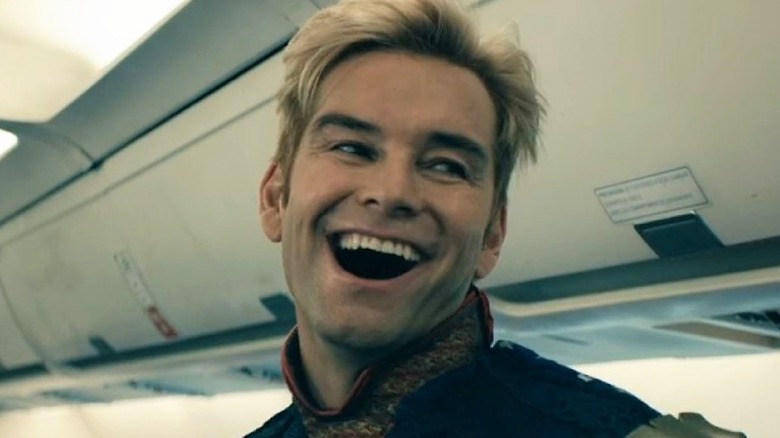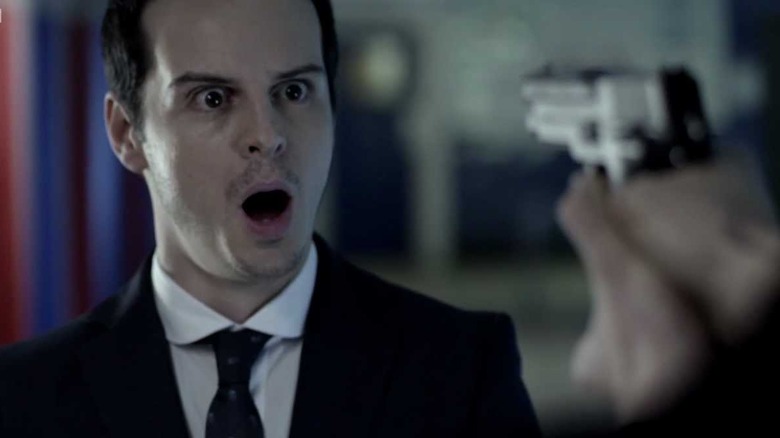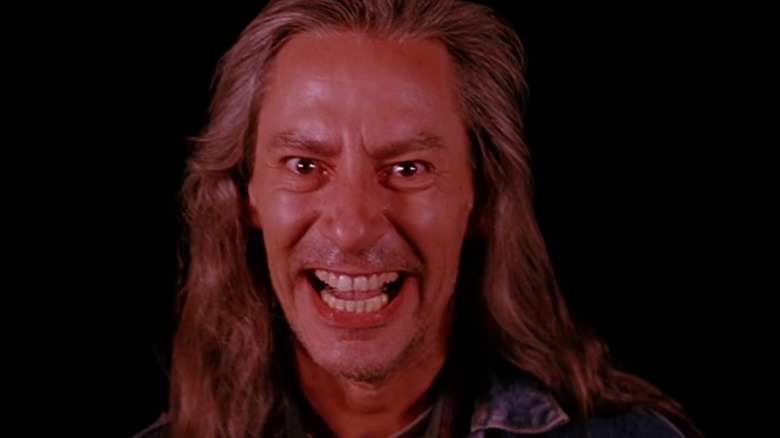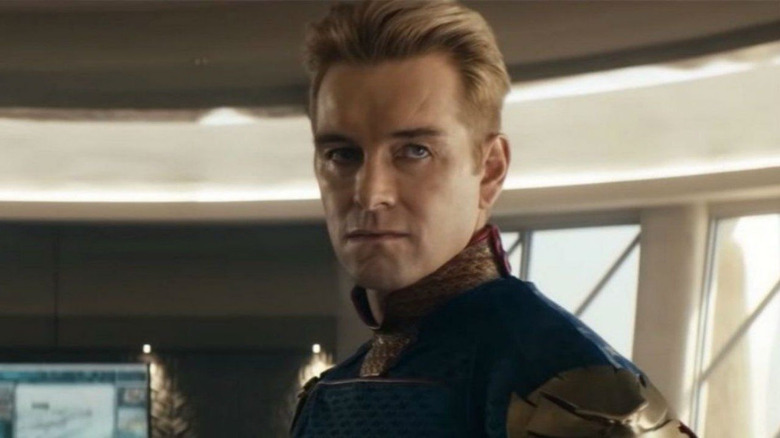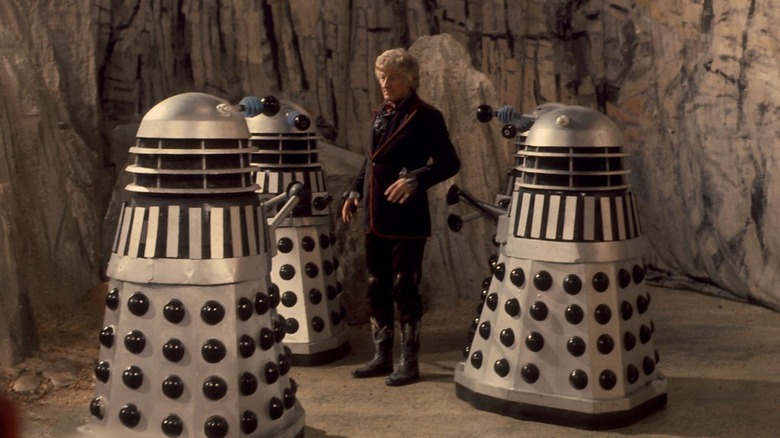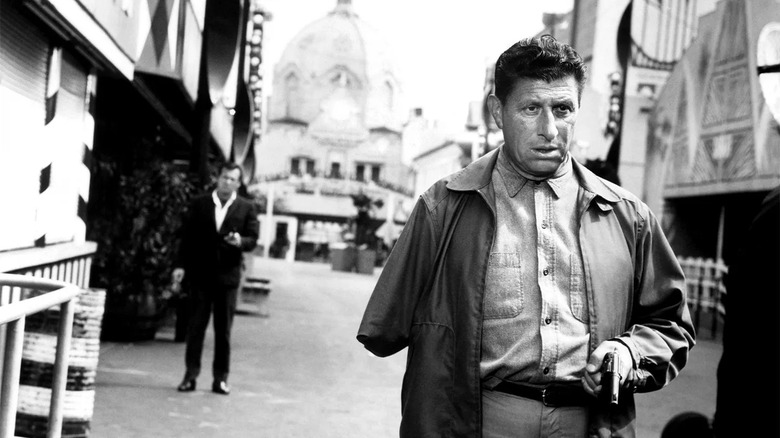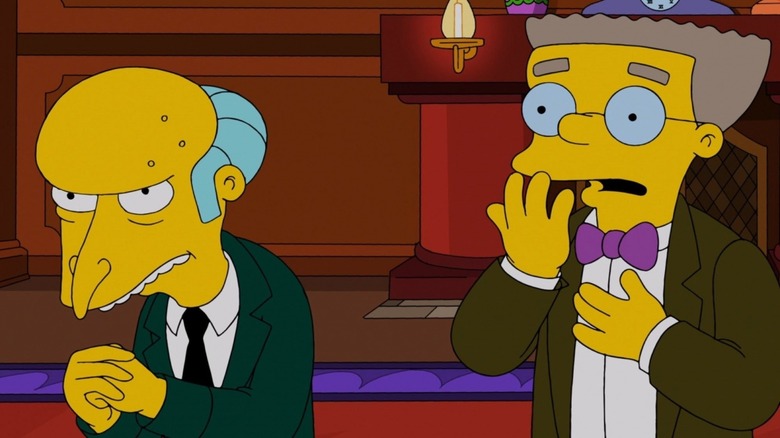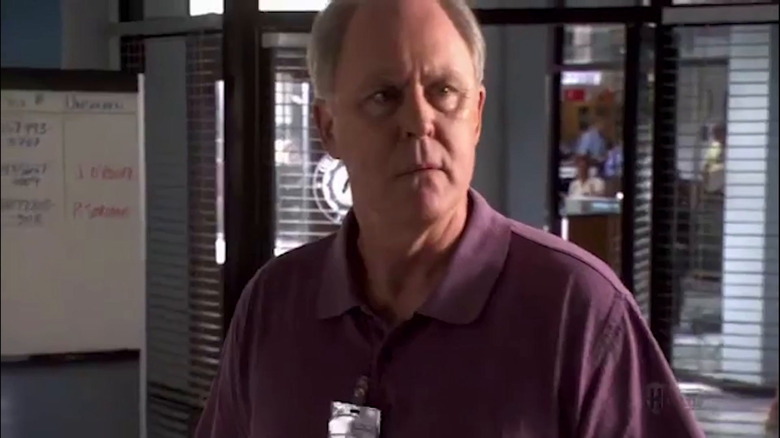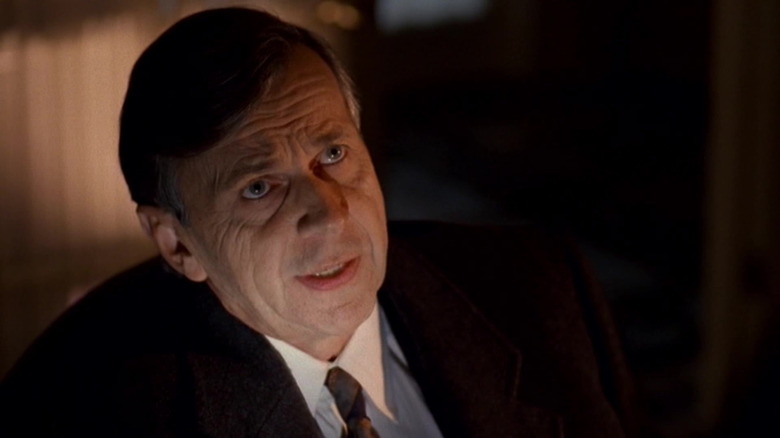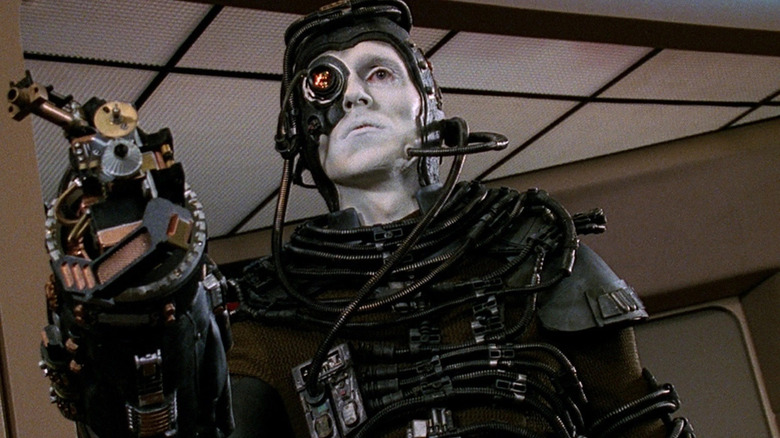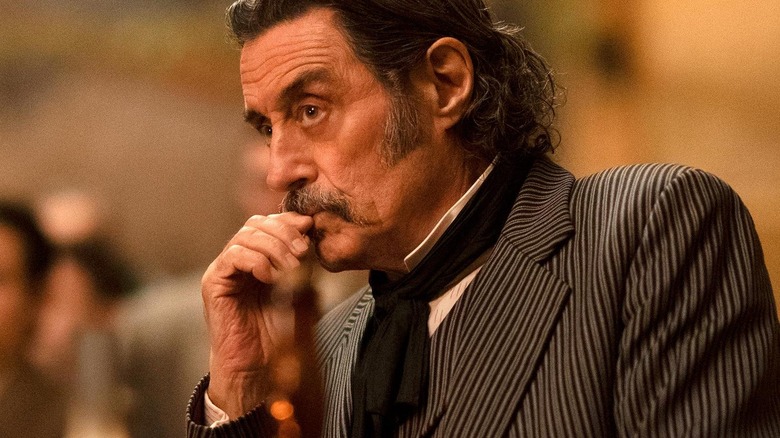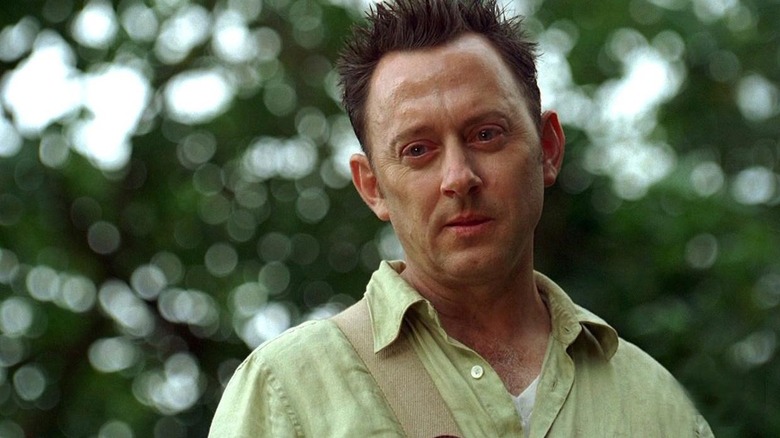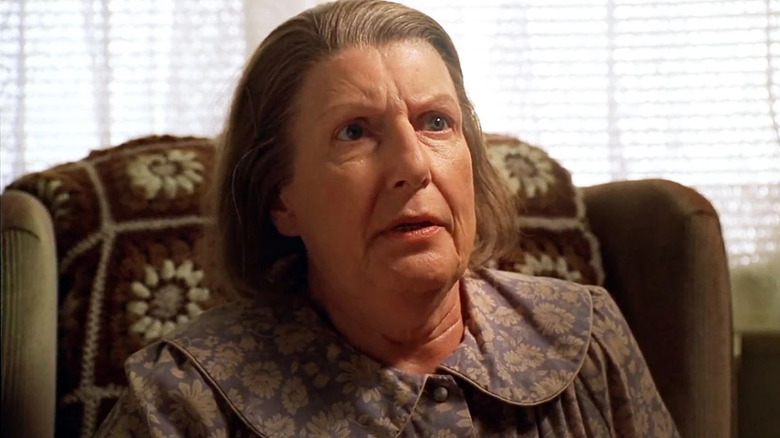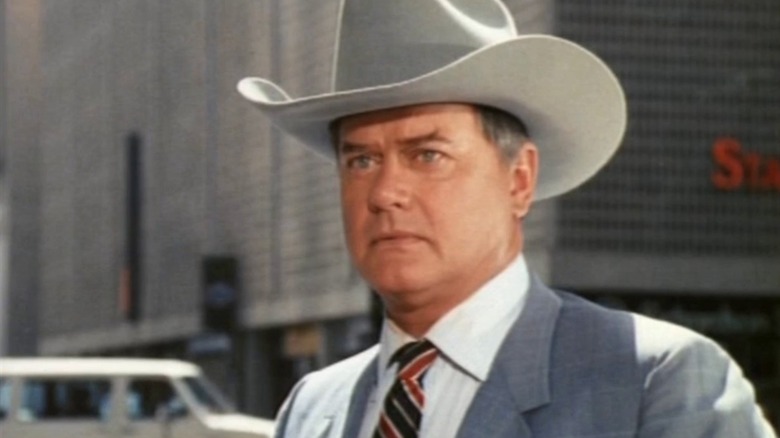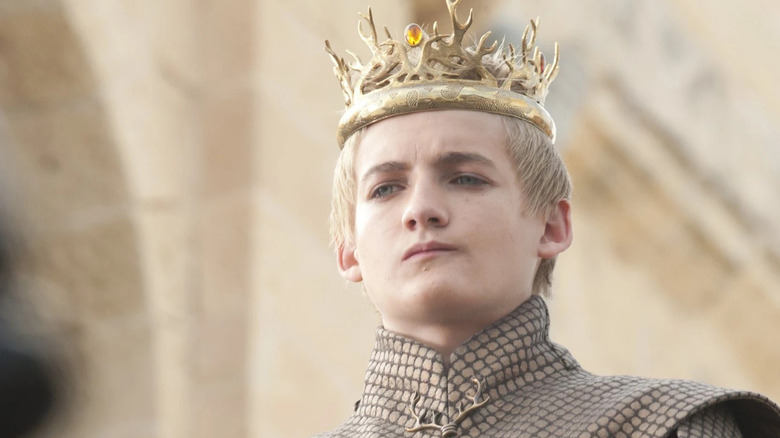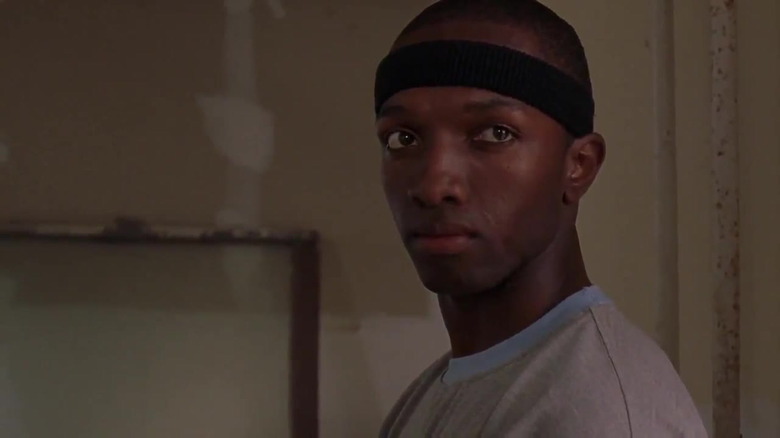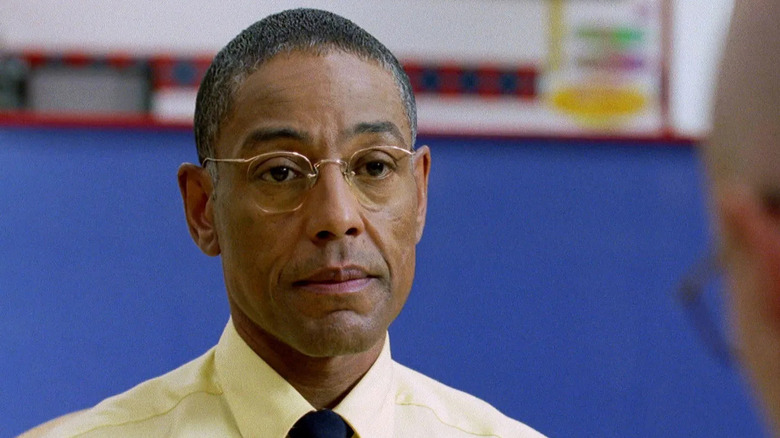Best TV Villains Of All Time
Heroes without villains aren't heroes at all. That's why the antagonist is as much a load-bearing beam in the structure of almost any story as the main character themselves. They're not just there to give the hero something to do. At least, they shouldn't be. Great villains are strong where the hero is weak, know just how to push them to the edge and beyond, and ultimately force them to grow as people in order to win, giving the protagonist's character arc its defining shape.
TV history has produced no shortage of timeless killers, crooks, schemers, mobsters, alien threats, demonic entities, drug kingpins, or just plain old passive-aggressive family members who know how to wield words as effectively as sticks and stones. There are so many great TV baddies, in fact, that many worthy foes—including Rowan Pope from "Scandal," Newman from "Seinfeld," Boyd Crowder from "Justified," Head Six from "Battlestar Galactica," Hannibal Lecter from "Hannibal," the Governor from "The Walking Dead," and Vern Schillinger from "Oz"—simply couldn't fit on this list. Believe us, we tried.
But the ones that made the cut are the best of the worst. From "Dexter's" Trinity Killer to Moriarty from "Sherlock" and more, these are the best villains in TV history.
Moriarty (Sherlock)
He's not an invention of television, of course, but everything about BBC's "Sherlock" was enough of a modern reimagining of Arthur Conan Doyle's literary detective classics to qualify here. Benedict Cumberbatch and Martin Freeman did exactly as well as you would expect—which is to say, wonderfully—as the titular Holmes and his assistant, Dr. John Watson. But the most fun character to watch here might be Holmes' archnemesis, Moriarty.
Played delightfully in the series by Andrew Scott (also known as the Hot Priest from "Fleabag"), Jim Moriarty is supposedly the world's only "consulting criminal," which might be a position made specifically to mock the "consulting detective" position of his foil, nemesis, and obsession, Sherlock Holmes. We wouldn't put it past him. He seemed to know he was playing a part, with lines like, "Every fairytale needs a good old-fashioned villain. You need me, or you're nothing." For his own amusement, he starts forcing Holmes to solve timed mysteries, with the price of failure being the execution of hostages. After revealing himself to Sherlock in one of the series' best scenes, he continued toying with and torturing the famed detective, even going so far as to steal the Crown Jewels just to draw him out in the open.
We won't spoil the ending of this legendary match-up, because if you haven't seen the series yet, we don't want to give you any excuse to keep putting it off.
Bob (Twin Peaks)
The name "Bob" doesn't exactly strike fear into your heart, does it? Well, it just might if you're a "Twin Peaks" fan. In that universe, Bob is actually an ancient, malevolent spirit who possesses humans and commits atrocities in their bodies in order to feed on the resulting misery. Fun stuff.
He (it?) wasn't the main villain of the show in the beginning, but he grew into exactly such a role by the second season of David Lynch and Mark Frost's beloved '90s mystery-horror hit on ABC.
As he investigates Bob's crimes, FBI agent Dale Cooper (Kyle MacLachlan) discovers haunting details about Bob. We learn that Bob has been serial killers and abusers of all kinds, committing heinous crimes that we can't describe here. We also learn Bob is from a parallel reality on the interdimensional plane known only as the Black Lodge, and that he demands the souls of anyone who trespasses there to harness the Lodge's power for themselves. It really seems like the show's creative heads are going through a lot of effort to avoid calling this "interdimensional entity" from a "parallel plane" what it clearly is: a demon. And one of the most terrifying ones ever put to screen.
Homelander (The Boys)
Based on Garth Ennis' comic series of the same name, Amazon Prime's "The Boys" asks a simple question: what if superheroes were real, and owned by a major corporation? The answer is pretty ugly (and wildly entertaining). The show's Superman stand-in, played by Antony Starr, is Homelander. A chisel-jawed day-saver—at least according to parent company Vought, which heavily promotes his good deeds and those of the other members of the Seven—Homelander is actually an arrogant and psychopathically violent sadist who secretly despises the people he's sworn to protect. Like most sociopaths in real life, he's capable of hiding this disdain behind a handsome grin. Money and power help ensure that a carefully crafted image of broadly popular do-goodery is maintained, but not even that can hide the danger that lurks behind those crystal blue eyes, which can turn into red lasers at any moment.
As the show goes on, we learn increasingly disturbing details about Homelander's true origins (hint: he's not the baseball-loving American good ol' boy his official story presents him as). He might be a white nationalist. The show is ongoing, so it remains to be seen what villainy he'll get up to in future seasons.
Nerdist points out that Homelander is meant to be a satire of how America is perceived around the world, as well as the embodiment of its post-9/11 nationalist hysteria that led to wars and human rights violations.
The Daleks (Doctor Who)
Anyone who hops in a blue police box and goes rocketing through time and space to save the day is bound to run into trouble at some point. That's literally the entire premise of "Doctor Who," the beloved, long-running British sci-fi cult hit. The show's various Doctors have encountered countless alien and otherworldly bad guys. But the Daleks—a race of cyborg aliens who demand complete submission to their will—are the most notable threat in the Whoverse.
No list like this would be complete without at least several characters based on the Nazis. Sure enough, according to Telegraph, creator Terry Nation patterned them after Hitler's Third Reich.
In the lore, the Daleks were created by a deranged Kaled scientist named Davros, whose people had been at war with the Thal race for a thousand years. Wanting to create a master race free of "weaknesses" like sympathy, he built the slimy aliens from scratch, slapped them in high-tech armor, and unleashed them upon an unsuspecting universe that they aim to purge of all life forms they deem inferior to themselves. Which is all of them.
Luckily, a certain Time Lord stands between them and universal domination, but not even Doctor Who is able to defeat them for good (at least, not yet). It's bad news for the fictional universe they all inhabit, but great news for "Doctor Who" fans, who've been treated to thrilling Dalek-centered episodes for literally decades with no end in sight.
The One-Armed Man (The Fugitive)
Just like in the Harrison Ford movie you might be more familiar with, "The Fugitive" TV show follows Dr. Richard Kimble (played by David Janssen), who's on the run from police detective Lieutenant Philip Gerard (played by Barry Morse) and seeking the truth after being wrongfully accused of murdering his wife. All he knows about the real killer is that the man had one arm and supposedly likes to bludgeon his victims.
Perhaps the best part about the One-Armed Man (Bill Raisch) is how little we see, hear, or know about him. For the first three seasons, he can hardly be called a character at all. He's only in a handful of episodes (10 total, by the time the show wrapped up in 1967), and serves primarily as a foreboding presence and a goal for Kimble. Like his hunter, the One-Armed Man takes odd jobs and assumes various false identities while fleeing or hiding. However, he has one advantage Kimble doesn't: the police are on his side. Whenever he gets a tip as to Kimble's whereabouts, destination, or next goal, he makes sure to hand it to the authorities in the hopes they'll arrest the Doctor (it doesn't work, thankfully).
It's a testament to Raisch's performance and a stellar writing staff that a character so rarely seen could be such an effective Big Bad.
Mr. Burns (The Simpsons)
Yeah, he's a cartoon. What of it? Like the obscenely wealthy elite he hilariously satirizes, Charles Montgomery Plantagenet Schicklgruber Burns—Homer's longtime billionaire boss over at the Springfield Nuclear Power Plant (who we'll just call Mr. Burns, if you don't mind)—is completely out of touch with the lives and experiences of the filthy peasants surrounding his gated estate. Always followed by doting manservant Smithers, Burns is so detached from reality that he doesn't even bother pretending to understand or care about others. It's rare to see the energy mogul without that iconic evil grin and those steepled fingers. He throws his money and power around without a care in the world, using both to do whatever he wants. He acts like he's above the law because, as evidenced by the fact that the authorities refuse to go near the guy, he is.
In one episode, it's implied that Burns likely killed his own 11 siblings just to position himself as the sole heir to his family fortune. In another, we learn that his mother is still alive, at age 122, but that he doesn't speak to her because she constantly belittles him and had an affair with President Taft. In still other "Simpsons" classics, we learn Burns' father was in the Civil War, that he still has "Confederate Slave Holdings" in his investment portfolio, and that he likes to bribe local officials to get what he wants. We suppose none of this is surprising.
The Trinity Killer (Dexter)
"Dexter" might've ended on a rough note (at least before its 2021 revival), but at its peak, it was must-watch prestige television. Based on the 2004 novel "Darkly Dreaming Dexter" by Jeff Lindsay, the story follows the titular Dexter Morgan (Michael C. Hall): a forensic tech who works for the police in Miami, analyzing blood patterns at crime scenes. However, when nobody's looking, he's also a serial killer who targets murderers who were either let off on technicalities or otherwise insufficiently punished.
In Season 4, we meet Arthur Mitchell. Like most John Lithgow characters, Arthur is an upstanding, tax-paying family man: the last person on earth you'd expect to be a serial killer with three decades of experience under his blood-stained belt. That's exactly what makes a bubbly, impossible-to-dislike actor like Lithgow such a perfect casting choice. It turns out that Arthur, AKA the Trinity Killer—so named because he murders in sets of three—bases his killings on his defining childhood trauma. We won't go into all the gory details here, but both the method and the victim of each murder are patterned after his ill-fated family members as a kid, all of whom suffered gruesome deaths indirectly traceable to an accident he caused when he was 10.
It's tragic, horrific stuff. But that, and the mystery surrounding the crimes that leads to thrilling manhunts, is exactly why the character represents "Dexter" at its horrifying best.
The Cigarette Smoking Man (X-Files)
The "Cigarette Smoking Man" is more of a foreboding presence in the early seasons of "The X-Files." The brooding face of the mysterious Syndicate eventually becomes the primary antagonist of the supernatural series. Even after the Syndicate is destroyed, he remains, always scheming to thwart Mulder and Scully's plans to reveal the existence of aliens to the world, so he can soften up the planet for extraterrestrial invasion. It sounds a little bit goofy if you've never seen the show, but actor William B. Davis turned the character into a chilling embodiment of a shadowy government operative who's up to God only knows what involving God only knows who.
Even as the show lumbers on and more about the Cigarette Smoking Man is necessarily revealed, his true motivations and capabilities remain shrouded. The audience eventually learns about his shady past, including his involvement in a secret cabal responsible for several infamous historical assassinations. Mulder and Scully only seem to know that he's up to no good, trying to lay out the red carpet for aliens for reasons he's reluctant to reveal beyond, "If people were to know of the things that I know... it would all fall apart." We suppose there's some honor in trying to preserve the fabric of organized society, not to mention a bit of recklessness, however well-intentioned, in Mulder and Scully's damn-the-torpedoes desire to uncover the truth. But it doesn't make the Cigarette Smoking Man any less of the ultimate They that keeps conspiracy theorists up at night.
The Borg (Star Trek: The Next Generation)
Most great villains inspire anger, fear, and revenge fantasies. The Borg, a parasitic cybernetic alien race in the "Star Trek" universe who are almost as famous as their "resistance is futile" catchphrase, inspire despair and hopelessness. That's a chilling but effective place to start. If surrender is the go-to option, you know you're dealing with a truly frightening baddie.
In one sense, this is an entire alien civilization, so putting them on here is almost like including all Nazis or the Empire from "Star Wars." But "Star Trek: The Next Generation" fans know that while the Borg can assume the appearance of any creature, it's actually a single organism, known as a hive mind. It's not an unheard-of science fiction concept—"Rick and Morty's" Unity and Beta-Seven characters spring to mind, as well as the Flood from "Halo"—but it's rarely, if ever, been done quite this well.
In the "Star Trek" universe, the process by which The Collective assimilates its innumerable victims is technological rather than biological. Nanoprobes are perhaps a little less unnervingly frightening than slimy tentacles invading your face holes and wrapping themselves around your brain, but when you realize the Borg also assimilates, uses, and learns from the technologies of its captive, constituent drones, you realize it is indeed a major threat that even the crew of the Enterprise can't handle on its own.
Al Swearengen (Deadwood)
HBO's "Deadwood," set in a late 19th-century western mining town in South Dakota, is easily one of the most slept on TV shows in recent memory. The show, helmed by David Milch, features a mix of fictional and historical elements and follows the titular community's ascent from a frontier camp to a thriving little town. The characters are great too, even if they're fictionalized versions of actual figures like Seth Bullock (Timothy Olyphant), Calamity Jane (Robin Weigert), Wild Bill Hickok (Keith Carradine), and Wyatt Earp (Gale Harold). Everyone brings their A-game throughout the series, but Ian McShane's Al Swearengen—murderer, pimp, gangster—is the slick glass of chilled bourbon you're really looking forward to when you sit down for an episode.
We're not quite sure how McShane pulls off making such a reprehensible person so oddly charming and enviably cool, but he does. He makes an absolute meal out of every line, sneer, sip, and trigger pull. But like all great villains, he wasn't flat or boringly one-note. As Rolling Stone points out on their own best TV villains list (where Swearengen ranked a cool 6th), the bar-owning mobster might exploit the titular town, but he'll be damned if he lets any other crooked politician or oil baron get their claws anywhere near it. We're positive that's only because he's invested so much time and energy positioning himself in the center of the town's institutions and wants to fiercely protect his investment. But it's something.
Benjamin Linus (Lost)
As evidenced by an infamous finale, the powers that be didn't know exactly how to end smash hit mid-2000s drama "Lost." But man, was it a wild ride getting to that point. The story follows de facto leader Jack Shephard (Matthew Fox), Sawyer (Josh Holloway), Hurley (Jorge Garcia), Kate (Evangeline Lilly), and the other marooned survivors of doomed Oceanic Airlines Flight 815, which crashes in the Pacific between Sydney and Los Angeles, kicking off the story. You could make the argument that hunger, thirst, disease, exposure, exotic creatures, interpersonal conflict, madness, and depression are the survivors' main antagonists, but series creator J.J. Abrams and the other creative leads didn't want to go the predictable route with this one. Instead, they filled the island with mysteries that kept viewers hooked for years. The survivors were first tipped off to the existence of those mysteries when they encountered The Others, led by a series of baddies. But one stood out from the others: Benjamin Linus.
The monstrously violent methods Linus employs to protect the island's secrets are chillingly offset by the character's awkward, neurotic, cagey mannerisms. But actor Michael Emerson did such an amazing job that by the end of the show, the character was a fan favorite who got his own redemption arc. Did he deserve it? Nope. But Emerson did such a brilliant, chilling job in the role that we honestly don't care.
Livia Soprano (The Sopranos)
You could make the argument that every major character on HBO's game-changing late '90s/early 2000s award-magnet megahit "The Sopranos" is a villain. These are, after all, murderous, thieving, corrupt, racketeering, blackmailing, bribing, backstabbing mobsters we're dealing with.
But this ugly rose simply must go to Livia Soprano. Played by the brilliant Nancy Marchand until her tragic passing in 2000, Livia is a cruel, vindictive, unloving mother to mafia don son Tony Soprano. She even tries to have him killed at one point. While that contributes to her placement on this list, it's only a part of the larger picture. A hard upbringing and a rough marriage to Johnny Soprano ultimately forged her into a vicious, lonely, passive-aggressive nightmare everyone should fear becoming in their old age.
She generally leaves the shooting and killing to Tony and those he surrounds himself with, but she knows how to wield words and whispers like knives, spreading lies and rumors to anyone and everyone around her simply to disrupt their lives and relationships, even to the point of violence. It truly does seem like she only delights in dragging everyone down into the depths of utter joylessness with her.
But nobody can sum her up better than her. "If you want my advice, Anthony," she once told her son, "don't expect happiness. You won't get it, people let you down ... It's all a big nothing. What makes you think you're so special?" Wow. Thanks, mom.
J.R. Ewing (Dallas)
Played by Larry Hagman in all 357 episodes of "Dallas," J.R. Ewing's villainous scheming almost makes him sound like a maniacally laughing cartoon. After all, the covetous, amoral oil baron spends much of the show's original run and the 2012 revival of the same name womanizing, backstabbing, bribing, bullying, blackmailing, manipulating, and slitting figurative throats in his bid to amass full control of his father's Ewing Oil company and the region at large.
The series makes it clear that J.R. is such a ruthless overachiever because he never got enough love from mom and dad, who showered his brothers with affection instead. From birth, he had to fight for what he felt was his, only achieving corporate control after a stint in Vietnam (which his tough-guy father framed as a necessary part of his manly training) and after his brothers went their own ways in life. By that point, J.R. was thoroughly set in the conniving, psychopathic ways that have made him such a fixture for so many decades.
But Ewing wouldn't have been the icon he is, on a show that ran for this long, if he were the flat, one-note character suggested by his reputation. The show sprinkles in just enough tenderness and vulnerability regarding his family that when he's betrayed or fails, you catch yourself empathizing with a man who almost never empathizes with others. It's a testament to Hagman's stellar, stable performance as one of TV history's best characters.
Joffrey Baratheon (Game of Thrones)
Less-than-stellar final season aside, "Game of Thrones" gave us several years of peerless prestige television. As any fan of the show or George R.R. Martin's books knows, there were plenty of villains lurking in Westeros and beyond. There were Tywin and Cersei Lannister, as well as Jaime (at least before his redemption arc). There was the Night King, who might've made this list if it weren't for his insultingly anticlimactic demise. There's the Mountain, too, and Melisandre, and Petyr Baelish, as well as countless minor characters like Walder Frey, Viserys Targaryen, various slavers, Jon Snow's enemies at the wall, and Lyssa Arryn. Ramsay Bolton, a monstrous sadist who briefly rules Winterfell, gets an honorable mention here, too.
But the dishonorable award ultimately goes to Joffrey Baratheon. That's truly saying something, if you think about it. Most of those other baddies were ruthless killers, conquerors, and torturers. Joffrey, who briefly rules the Seven Kingdoms following the death of his father Robert Baratheon (well, his actual father is his uncle Jaime, but whatever), is a snot-nosed brat. He does have moments of violence, like ordering Ned Stark's beheading and torturing and killing some women in his chambers. But for the most part, Jack Gleeson's character makes the list for being a stupid, arrogant, spiteful, sneering, cold, cruel, vindictive, impulsive, utterly loathsome kid who's more fun to hate than almost anyone else on this list.
Marlo Stanfield (The Wire)
"The Wire," which examines a self-sustaining wheel of rot and corruption in early 2000s Baltimore as a larger condemnation of society itself, might just be the finest piece of television ever produced. It's got no shortage of timeless villains. It has Stan Valchek and Bill Rawls, two cut-throat, high-ranking cops who stop at nothing to climb up the ladder. Then there are Stringer Bell and Avon Barksdale, two old-school gangsters who run a heroin-slinging op in the city's projects. There's Maury Levy, a sleazy but seasoned lawyer who represents the top dogs in the city's criminal underworld. There's the Greek, who supplies the city's gangs with their drugs. Even our "heroes" make enough questionable choices throughout the show that it's hard calling them that.
But the most chilling character on the show (or possibly any show) is Marlo Stanfield. Young, hungry gangbangers who seek the "crown" of being the most feared name on the corners are nothing new in the world of "The Wire." What sets Marlo apart is the frightening, sociopathic methods he and his subordinates Chris Partlow and Snoop employ to get ahead. Before long, far more experienced and established players are either dead, imprisoned, or cowering in fear. Perhaps their greater experience itself was their downfall—they were so set in their ways that by the time they realized this violent newcomer couldn't be contained with the usual methods, it was too late.
Gus Fring (Breaking Bad)
It might sound like we're insulting Vince Gilligan and the other writers on "Breaking Bad," one of the greatest TV shows in history, by pointing out that plot armor likely played a bigger role in Walter White's victory over Gustavo Fring than we'd like to admit. That's not to say the steps leading to the iconic moment—in which the Chilean restauranteur/international meth kingpin has his face blown off by a wheelchair bomb—weren't fought for and well earned.
But Gus Fring, played by a chilling and terrific Giancarlo Esposito (who's since gone on to enjoy great success), was Walt 2.0. He wasn't much of a chemist, but he was every bit as brilliant as his top cook, if not more so. He didn't have Walt's baggage, either: a terminal cancer diagnosis, a dangerous ego, a family situation that was either on the brink of collapse or actively collapsing, at any given moment, or family in the DEA (although Hank's investigation of him admittedly had nothing to do with that). He knew the players and the game like nobody's business. Before he foolishly let Heisenberg into his operation, he had something Walt never enjoyed, even for a moment: stability. It was all planned out, well-oiled, and running like clockwork.
It took everything Walt and Jesse had to get the drop on cold, calculating, ruthless, terrifying Fring, who spent much of the series 10 steps ahead of every threat, our two meth-cooking protagonists included.
